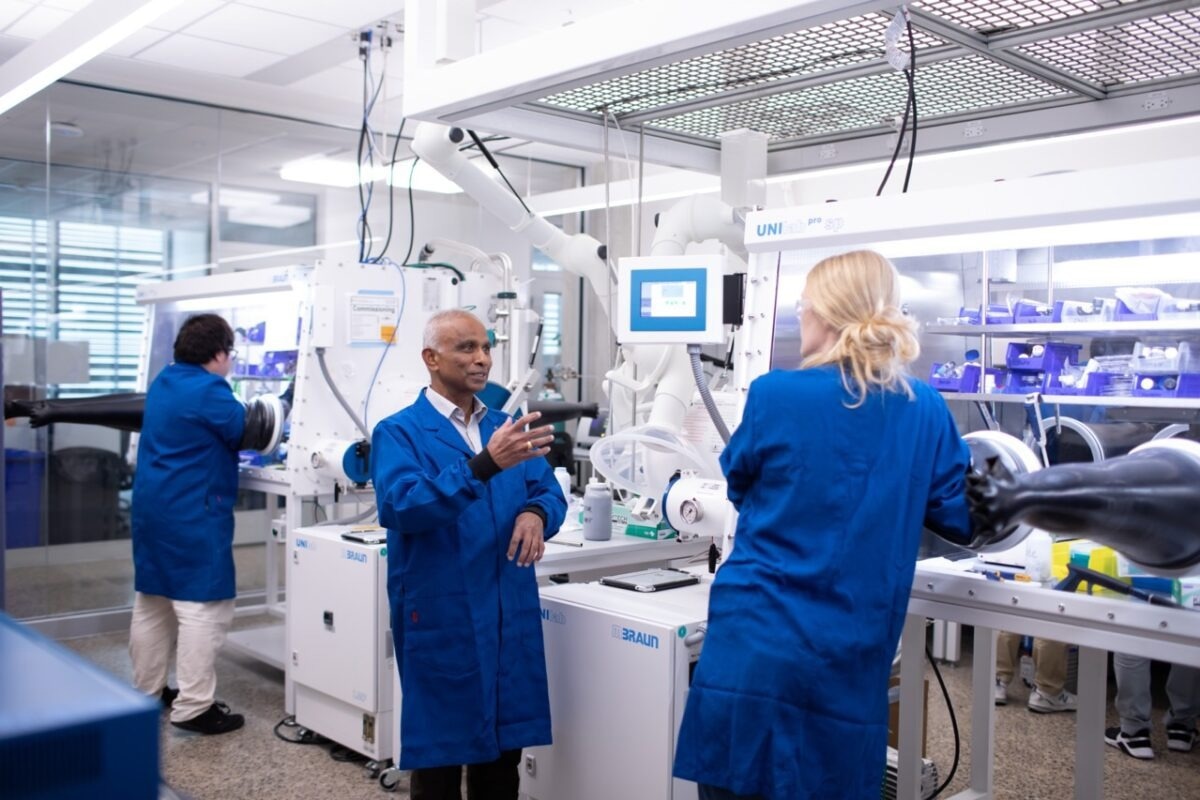Researchers at The University of Texas at Austin have created a sodium battery that uses cheap, abundant materials as its building blocks and drastically lowers the technology’s fire risk.
 Mechanical engineering professor Arumugam Manthiram talks to students at his battery lab in the Gary L. Thomas building at The University of Texas at Austin. Image Credit: The University of Texas at Austin
Mechanical engineering professor Arumugam Manthiram talks to students at his battery lab in the Gary L. Thomas building at The University of Texas at Austin. Image Credit: The University of Texas at Austin
Battery fires are uncommon; however, as more batteries are used, such occurrences are rising.
A solid diluent is the key component of this sodium battery innovation, which was just published in Nature Energy. To facilitate the charge-discharge cycle, the researchers employed a solid diluent in the electrolyte that was based on salt.
The researchers stabilized the battery overall by using just one nonflammable solvent in the electrolyte, thanks to a specific type of salt called sodium nitrate.
The electrolyte, which is the material that moves charge-carrying ions between the battery’s two electrodes, is made up of many liquid solvents that, when combined with other substances, eventually deteriorate batteries and pose safety hazards. One of the main components of this battery, sodium, is a highly reactive substitute for lithium.
This presents a major barrier to the widespread use of these types of batteries. The battery can electrically short-circuit due to these processes, and it could even burst into flames or explode due to the development of needle-like filaments known as dendrites.
Batteries catch fire because the liquid solvents in the electrolyte don’t get along with other parts of the battery. We have reduced that risk from the equation to create a safer, more stable battery.
Arumugam Manthiram, Professor, Walker Department of Mechanical Engineering, Cockrell School of Engineering, The University of Texas at Austin
This new sodium-based battery is safer than lithium-ion batteries, which power laptops, electric cars, cell phones, and other devices. It is also less costly.
The battery has excellent performance. With time, a battery’s capacity to hold a single charge decreases. After 500 cycles, the new sodium battery retained 80% of its capacity, similar to the lithium-ion batteries found in smartphones.
Manthiram added, “Here we show a sodium battery that is safe and inexpensive to produce, without losing out on performance. It is critical to develop alternatives to lithium-ion batteries that are not just on par with them, but better.”
Although the technology was used on a sodium battery, the researchers claimed it could also be used on lithium-ion cells, albeit using different materials.
The environmental impacts of lithium mining, which include excessive groundwater consumption, soil and water contamination, and carbon emissions, have been criticized in addition to being costly. In contrast, sodium is more affordable, more readily available, and better for the environment when found in the ocean.
Cobalt, which is costly and primarily mined in the Democratic Republic of the Congo in Africa, is another material commonly used in lithium-ion batteries. Its mining harms both the environment and human health. Manthiram showcased a brand-new lithium-ion battery devoid of cobalt in 2020.
In addition to being lithium-free, this battery also lacks cobalt. The remainder of the parts comprise 30% manganese, 30% nickel, and 40% iron.
The other authors of the study are John Okasinski from Argonne National Laboratory and Jiarui He, Amruth Bhargav, Laisuo Su, Julia Lamb, and Woochul Shin, who are affiliated with the Materials Science and Engineering program at the Cockrell School and Texas Materials Institute.
Engineering Fire-Resistant Batteries
Video Credit: The University of Texas at Austin
Journal Reference:
He, J., et. al. (2024) Tuning the solvation structure with salts for stable sodium-metal batteries. Nature Energy. doi:10.1038/s41560-024-01469-y.